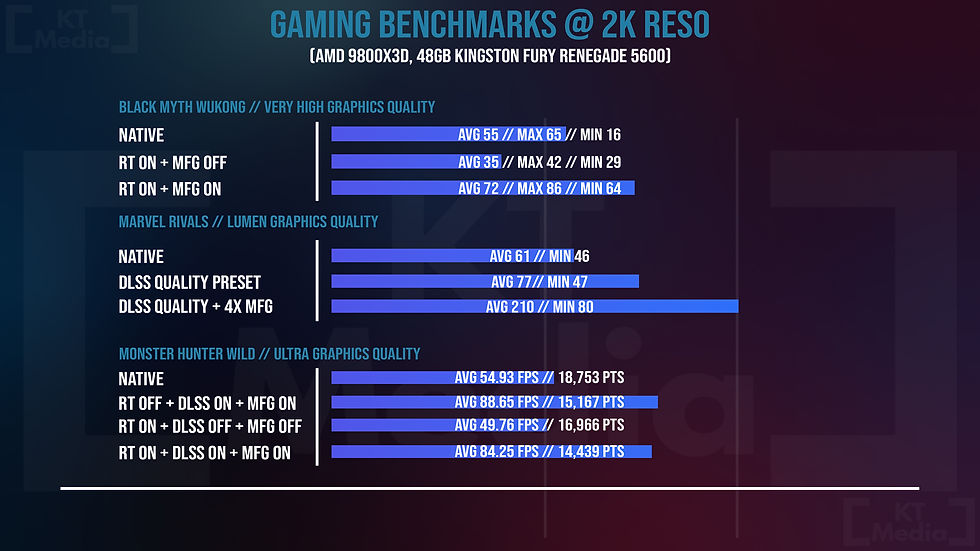MSI RTX 5060 Ti Gaming Trio OC 16GB Review: Great Build, Misguided Origins
- Anu R.

- May 7, 2025
- 4 min read

Let’s be honest, the RTX 5060 Ti wasn’t exactly the most anticipated GPU release. Much of the early skepticism comes down to NVIDIA’s positioning and specs choices for the 50-series lineup. That said, it’s worth pointing out that board partners like MSI have clearly done their part to deliver the best possible experience with what they were given, from cooling design to build quality. So any critique here is more about the overall direction of the GPU itself rather than the effort or execution from AIB partners.
Powered by the Blackwell architecture, the RTX 5060 Ti does offer some upgrades, but most of them get overshadowed by one big issue : pricing. The generational leap, if you can call it that, is underwhelming for most users.

Just look at the Steam Hardware Survey, nearly 30% of gamers are still rocking older 60-series cards, GTX 1060s, RTX 2060s, 3060s, even the 3060 Ti. And frankly, there’s little here that justifies jumping ship, especially if you’re considering the 8GB variant of the RTX 5060 Ti. That card shouldn’t even exist in 2025. Asking over $350 for an 8GB card makes zero sense when just a few years ago, the RTX 3060 offered 12GB of VRAM at around RM1300-RM1400 in Malaysia. Today, for similar money, you get less VRAM? That’s a hard pass.
But let’s move on to what this article is really about: the MSI RTX 5060 Ti Gaming Trio OC 16GB.

This card is based on the GB206 die and comes with 4608 CUDA cores, 144 5th-gen Tensor Cores, and 36 4th-gen RT Cores. It features a base clock of 2.41GHz and boosts up to 2.57GHz. The 16GB of VRAM is paired with a 128-bit memory interface, pushing a memory bandwidth of 448 GB/s. The MSRP for this model stands at $429, while the aforementioned 8GB variant retails at $379 USD.

One of the genuine strengths of the RTX 5060 Ti 16GB is its power efficiency and thermals. Performance wise, NVIDIA's claims about a “50x” leap feel like pure marketing fluff. The card handles 1080p and 1440p gaming decently in rasterization-heavy titles, but let’s be very clear, this is not a 4K card. Claims suggesting otherwise are simply misleading. In our in-house testing, which follows consistent methodology across all GPUs, we ran Black Myth : Wukong at 4K with Ray Tracing enabled. The results? An average of 29 FPS and a maximum of 31 FPS which is not playable by any standard.
Enabling Multi-Frame Generation (MFG) didn't help either. In fact, the stuttering and latency issues were so severe that it made the experience worse, similar to what we saw with the RTX 5070. Ray Tracing combined with MFG on this tier of GPU just doesn’t deliver a smooth 4K experience.
That said, if you stick to 1440p gaming, the MSI RTX 5060 Ti Gaming Trio OC 16GB delivers fairly consistent performance in most modern titles especially when ray tracing is turned off or used moderately. Below are our in-house gaming and synthetic benchmarks conducted at 2K resolution, showcasing how the card stacks up across a variety of scenarios.
Benchmark results and charts below:

That said, things took a turn when we tested this card in a hybrid workstation environment. Thanks to its 16GB VRAM, the RTX 5060 Ti outperformed both the RTX 4070 and 4070 Super in creative workloads. In applications like Adobe Photoshop, Premiere Pro, and DaVinci Resolve, the card showed promising results. We also ran UL Procyon’s AI benchmarking suite, covering video editing, Windows ML, Stable Diffusion 1.5 and XL, and AI text generation. The RTX 5060 Ti landed comfortably between the 4070/4070 Super and the 4070 Ti in terms of raw AI performance. For those working with creative or AI-based tools, this makes it a surprisingly capable card.
Another point worth highlighting is that, finding a brand new 4070 or 4070 Super is increasingly difficult in 2025. Most listings are for used units, and they’re still going for nearly RM3000. That’s essentially the same price they launched at when new. In contrast, the MSI RTX 5060 Ti Gaming Trio OC 16GB is priced at RM2500, and comes with a full 3-year manufacturer’s warranty. Given the uncertainties of the used GPU market, this makes the RTX 5060 Ti a no brainer if you're choosing between a new and warrantied GPU or a secondhand card with unknown history.

Now, let’s address one odd design choice MSI made here. Despite this card having a modest 180W TDP, it uses the 12V-2x6 PCIe connector instead of a traditional 8-pin. Personally, I would’ve preferred the old-school 8-pin connector for a card of this power level. But to MSI’s credit, they have a compelling ecosystem solution on the horizon. The upcoming MSI MAG A750GLS PCIe 5.1 PSU. This new ATX 3.1-certified unit features their unique yellow 12V-2x6 cable that visually indicates whether the connector is properly seated, a thoughtful design that eases installation and gives peace of mind. (More on that PSU in an upcoming article.)
As for the Gaming Trio OC cooler itself, MSI has done a stellar job. The Tri Frozr 4 thermal design, coupled with the signature Stormforce fans and nickle plated copper base plate, does a remarkable job in keeping the card cool. During our tests, even under heavy gaming loads that drew up to 187W, GPU temperatures never exceeded 69.1°C. That’s impressive, especially for a triple-fan setup. The card also features a full metal backplate, and its overall build quality and aesthetic design are excellent, one of the nicest in the 50-series lineup.
In conclusion, the MSI RTX 5060 Ti Gaming Trio OC 16GB is a well executed card from MSI, let down only by NVIDIA’s positioning and pricing strategy. The hardware itself is solid, cool, quiet, efficient, and even workstation capable in the right use case. But NVIDIA needs to take a hard look at the market reality. Gamers and creators are savvy today. They know value when they see it. And right now, the RTX 5060 Ti, especially the 8GB version, just doesn’t cut it. Price adjustments could turn the tide for this generation, but until then, this remains a niche pick for those who specifically need 16GB VRAM in a new midrange GPU, backed by warranty and quality cooling.



























Comments